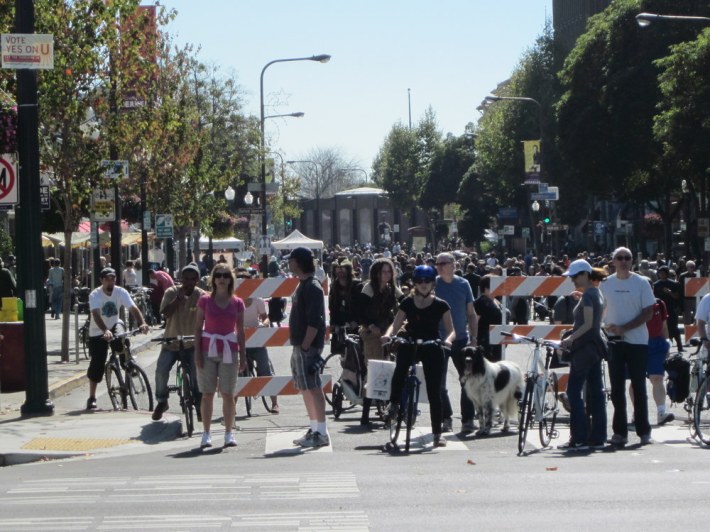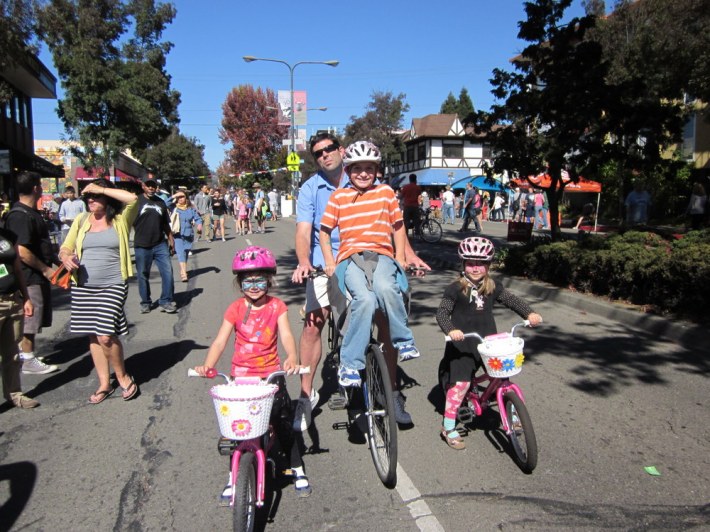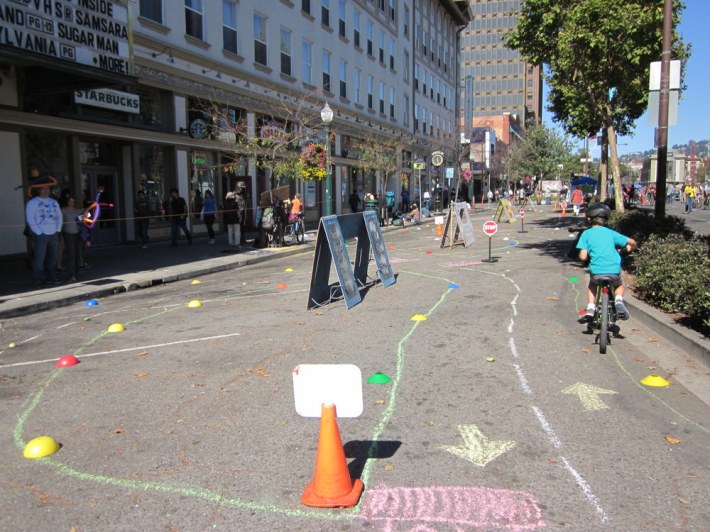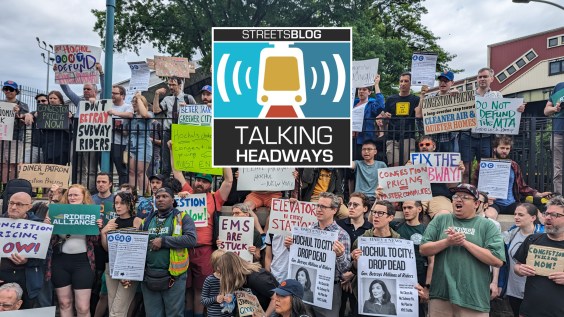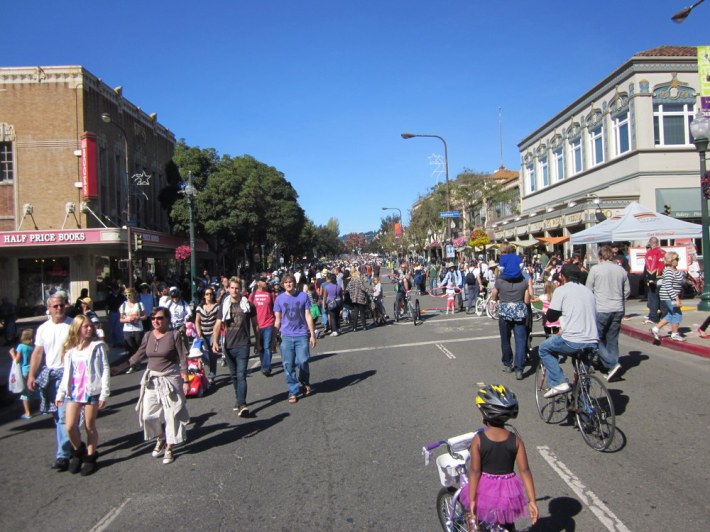
Seventeen blocks of Shattuck Avenue, normally one of Berkeley's most traffic-clogged streets, were filled with an estimated 30,000 to 40,000 people walking, biking and skating for the debut of Sunday Streets Berkeley this weekend.
“It was a huge success,” said Erin Rhoades, executive director of Livable Berkeley, one of the event's main organizers. “It’s evidence that the community was really ready for an event like that – to be in the right of way, in a way that was totally non-auto oriented.”
For five hours, more than a mile of Shattuck -- from Haste to Rose Streets, through the downtown area and Gourmet Ghetto -- was car-free, dedicated to human activity and non-motorized transportation. Walking and biking down Shattuck offered an opportunity to explore the neighborhood’s stores and restaurants in a new way, and many merchants took advantage by opening their doors wide and putting out tables on the sidewalk.
“It’s being able to take back a street and not having to worry about cars,” said Berkeley Council Member Laurie Capitelli. “People see their neighborhood in a whole new light. When you’re in a car, you miss a lot of it.”
Rhoades said she approached the mayor’s office with the idea to emulate the success of Sunday Streets in San Francisco, which will hold the last of this year's ten events this weekend. With East Bay residents regularly traveling across the bay to attend SF's events, Rhoades sought to bring Sunday Streets home.
“We wanted to see a huge [section] of the community come and experience Berkeley in a different way, to be able to imagine new possibilities for how Berkeley could become more bicycle- and transit-friendly, and become advocates,” Rhoades said.
The idea of major street openings was enthusiastically embraced by Berkeley Mayor Tom Bates and the City Council, as well as local merchants associations, said Rhoades. The idea has spread to cities around the world inspired by the original Ciclovia events in Bogotá, Colombia. And in the Bay Area, similar street openings have been held beyond San Francisco in recent years, including San Jose's ViaVelo and San Mateo County's Streets Alive, which now includes 13 cities.
To ensure a robust turnout at Sunday Streets Berkeley, organizers raised about $30,000 for publicity and limited the length of the route to keep activities within an easily reachable distance of one another. Organizers sought to avoid a repeat of the somewhat low turnout at Oakland's Oaklavia in 2010 -- the East Bay’s only Sunday Streets-style event before Berkeley's -- which left Oakland organizers and agencies wary of another attempt.
The strategy appears to have paid off: If there was any complaint among attendees, it was a shortage of room for the throngs of people.
Shattuck's four lanes, usually reserved for vehicle traffic, were instead filled with kids, parents with strollers, and adults of all ages, including some using canes and wheelchairs. People took free yoga, Zumba, and swing dance classes while musicians provided rhythm throughout the route.
“It just feels good seeing people walk and bike by. It’s like a big park,” said Mike Perlmutter, 36, as he stood listening to Balkan music at the corner of Shattuck and Bancroft Way. Perlmutter said he lives in Berkeley and mostly commutes by bike. “Usually I avoid Shattuck, but today, I’m riding my bike.”
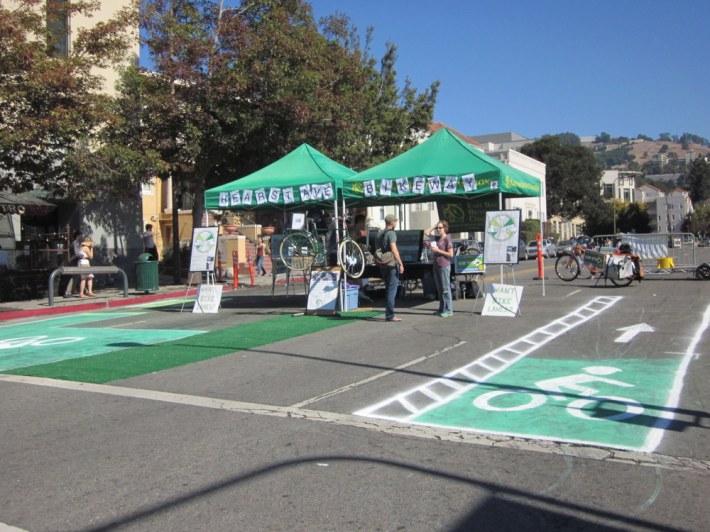
Aiming to encourage bicycling beyond Sunday Streets, the East Bay Bicycle Coalition gave a preview of Berkeley's first buffered, green bike lanes, which have been proposed for Hearst Avenue. Local bike shops Mike’s Bikes and the Missing Link Bicycle Cooperative offered free bike repair; kids pedaled through an obstacle course set up by non-profit Cycles of Change; and “bike rapper” Fossil Fool performed on a bike-pedaled stage.
Although city agencies must negotiate how to pay for the costs of the event, estimated at $15,000 to $20,000 (including staffing costs for the police and public works departments), organizers and city officials are already set on planning future events.
Council Member Capitelli, who suggested holding future events along San Pablo Avenue or University Avenue from the bay to the UC Berkeley campus, said he plans to propose a resolution at the November City Council meeting asking city departments to waive the fees.
“We have a tight budget,” Capitelli said. “But communities need to celebrate and do things like take back our streets, and spend time with one another. City governments should support that.”
